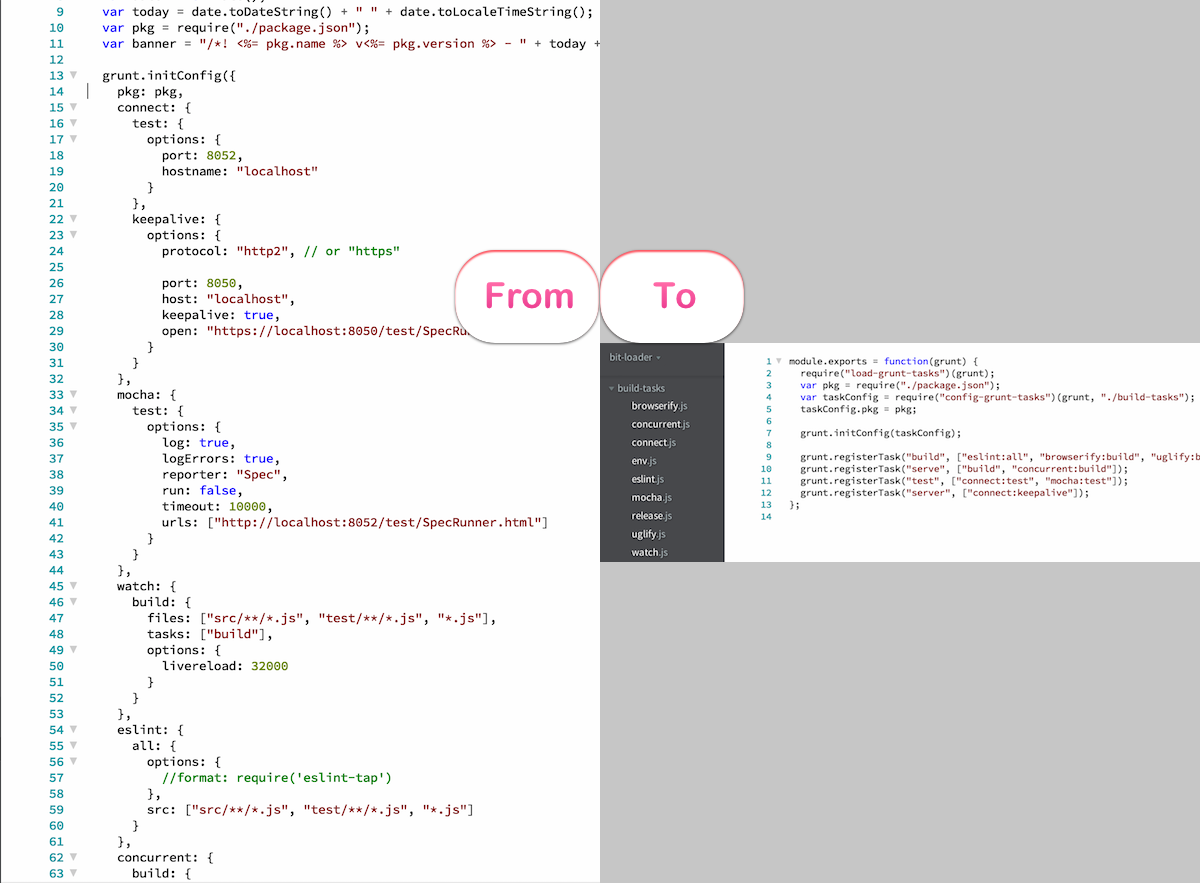config-grunt-tasks
v1.0.3
Published
Grunt task configuration loader
Downloads
31
Readme
config-grunt-tasks
Grunt task configuration loader that helps organize your
Gruntfile.jstasks configuration.
The idea is to modularize your tasks configurations to make your setup more approachable and easier to work with. So instead of having one ginormous Gruntfile.js, you break out all your tasks' configurations into separate files and put them in a common directory. You can then tell config-grunt-tasks about your directory so that it can load all these configurations for ya. I personally like to create a folder called tasks, which contains all the different configurations for each grunt task in separate JavaScript files. But config-grunt-tasks is flexible enough to let you customize how you slice your pie.
config-grunt-tasks goes really well with load-grunt-tasks.
Also, this article by Thomas Boyt is good literature on the topic.
Install
npm install --save-dev config-grunt-tasksPicture this

Conventions
config-grunt-tasks uses conventions for mapping task configurations to file names. That is to say that your eslint task will require a file called eslint.js in your tasks directory, where all your grunt tasks are stored. This eslint.js should export JSON to configure your eslint task, or a function that is called to get JSON your eslint settings.
When your task file exports a function, it will get called with the current instance of Grunt as the first argument.
Examples
Please see examples for an actual Gruntfile.js file and a folder with tasks. Otherwise, below you will get quick examples of what your gruntfiles might look like.
First,
let's look at a setup where config-grunt-tasks loads all the tasks in you tasks folder.
module.exports = function(grunt) {
require("load-grunt-tasks")(grunt);
var pkg = require("./package.json");
var taskConfig = require("config-grunt-tasks")(grunt, "./tasks");
taskConfig.pkg = pkg;
grunt.initConfig(taskConfig);
grunt.registerTask("build", ["eslint:all"]);
grunt.registerTask("test", ["connect:test", "mocha:test"]);
};Second,
let's look at a setup where config-grunt-tasks loads specific tasks. Some people like more control over their stuff! I am certainly not judging you. :)
module.exports = function(grunt) {
require("load-grunt-tasks")(grunt);
var pkg = require("./package.json");
var taskConfig = require("config-grunt-tasks");
grunt.initConfig({
pkg: pkg,
connect: taskConfig(grunt, "./tasks/connect.js").connect,
mocha: taskConfig(grunt, "./tasks/mocha.js").mocha,
watch: taskConfig(grunt, "./tasks/watch.js").watch,
eslint: taskConfig(grunt, "./tasks/eslint.js").eslint,
concurrent: taskConfig(grunt, "./tasks/concurrent.js").concurrent,
uglify: taskConfig(grunt, "./tasks/uglify.js").uglify,
release: taskConfig(grunt, "./tasks/release.js").release
});
grunt.registerTask("build", ["eslint:all"]);
grunt.registerTask("test", ["connect:test", "mocha:test"]);
};I have several of my projects where I use config-grunt-tasks. Time permitting, all my projects will get this treament. But here are some if you want to checkout how I use it.
License
Licensed under MIT
